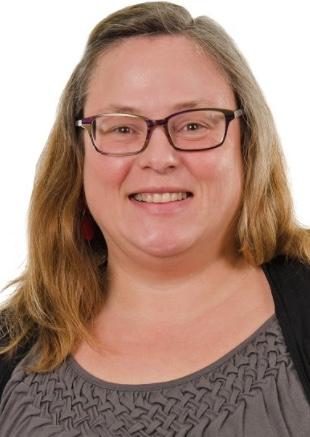By Allison Campbell-Jensen
A renovation, a new website, a new strategy for collections — these are just a few of the projects in which Librarians and staff might be involved. Yet when Carla Pfahl, Reference Outreach and Instruction for Minitex, was in library school, project management concepts were never discussed. Afterwards, she found that projects abound in libraries.
Recognizing how her work would benefit, Pfahl earned a certificate in project management from the University’s College of Continuing and Professional Studies. And now she is offering a professional development series to librarians and library staff throughout Minnesota, as part of Minitex’ outreach work.
Often overlooked
At the first of the six-session series, Pfahl asked the attendees how many had backgrounds in project management. More than 75% did not. Then she asked: “In the job you were hired for, was project management experience listed as needed, required, or preferred? It was similar, 75% to 80% said no.” But when asked if they do projects at work, about 60% said yes.
“There’s a big imbalance there,” Pfahl says. Clearly, the need for these skills is recognized — she’s had more than 200 people sign up for each session.
In the Q&A portion of the sessions, though, she has been surprised to learn that many had trouble identifying what constitutes a project. “A project is anything that has a deadline, an end date to it,” Pfahl says. “If it doesn’t have an end date, it’s really a process.”
Defining projects
“We all do projects. We just need to have the skills to facilitate our work, so we can really amplify our success.”
—Carla Pfahl
At the University, for instance, librarians set annual goals that they need to develop and execute. “Really, those are projects,” she says, “personal and professional projects.” Then there are team-based projects, such as work on committees.
Then there are really big renovation projects, like the ones done previously by Nicole Reuter, Access Services Manager at the College of St. Benedict/St. John’s University Libraries. She decided to take the Project Management course to be better prepared for the next time. “What did I do right? What could I have done to make it easier or better? How could it be more efficient?” She finds the course valuable, creating a project, goals, scope, and timeline. Says Reuter: “I’m kind of looking forward to the next project.”
Similarly, Robin Ewing hopes the course will contribute to better outcomes at the St. Cloud State University Library. She is a professor and faculty chair for the library, and they are working on a new strategic plan. “We are going to have a lot of projects in this plan,” she says. “This has not been a strength. We get things started and don’t finish.”
They want to redesign their website and revamp their collections policy with a diversity, equity, and inclusion lens. When interviewed, Ewing had just participated in the third webinar led by Ashley Alexander, Organization Development and Learning Associate for the U of M Libraries. “She walked us through the detailed steps, how you work with stakeholders, and talked about a risk management plan.”
Bringing in others with project management experience to lead sessions was a way to add balance, says Pfahl. “I looked for academic support as well as public library support and consortium support with Minitex.”
Ewing said she also appreciates that Pfahl divided the information into digestible portions, making it easier to focus on Friday afternoons.
Communication is key
“Communication is woven through every aspect,” Pfahl says. “That’s the driving piece we are trying to get through.” It’s important to recognize the differing communication needs of people in different roles. Some oversee the project and so have little direct involvement — but are concerned with its success — while other people are very heavily invested in it, spending a good measure of their time on it. Then there are other roles.
“We all do projects,” Pfahl says. “We just need to have the skills to facilitate our work, so we can really amplify our success.” And start, proceed, and finish well.





